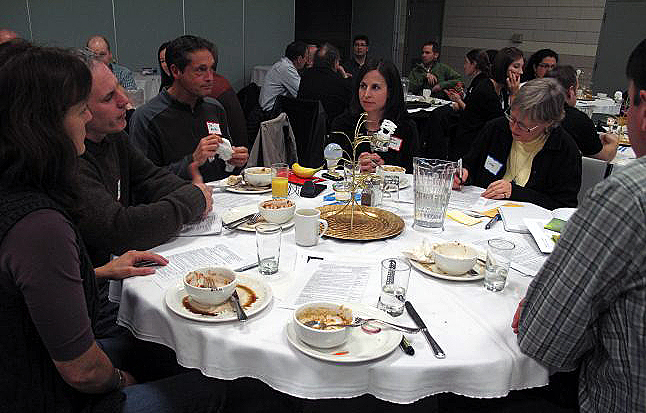
By Laura Stovel
The City Planning Office opened Revelstoke’s draft Community Energy and Emissions Plan for public review in a series of events that began with a working dinner and an Energy Fair (open house) at the Community Center on Thursday. The draft plan, prepared by Megan Lohmann and Michael Wilson of thinkBright Climate Solutions and Enerficiency consultancies, outlined steps that the City could take to save energy and reduce emissions in Revelstoke.
While the plan presents a wide range of options, from vehicle tune-up workshops to the use of wind energy on Mount Mackenzie, it focuses on 17 main recommendations where the consultants think City policies and actions can have the biggest impact.
Recommendations include: expanding the district energy system and ensuring that building density is high enough to make provision of district energy economical; expanding cycling infrastructure, summer and winter, and requiring bike racks at all new developments; promoting and enforcing the existing anti-idling bylaw; and educating homeowners on the best ways to retrofit their houses while providing a low-cost, easy-to-install product package to assist them. (See below for the full list of recommendations).
The consultants also recommend increasing Revelstoke’s greenhouse gas reduction target. The City has currently committed itself to reducing greenhouse gases by 6% below 2007 levels by 2020. Wilson argued that, even with growth estimates, Revelstoke could realistically reduce greenhouse gases by 8% of 2007 levels by 2020 and by 15% by 2030. “A lot of people think we should have more drastic targets,” he said, but “we think it’s better to use the more conservative, practical target for 2020 and the more visionary target for 2030.” By comparison, BC’s Bill 44, the Greenhouse Gas Emissions Act of 2007 sets the provincial greenhouse gas reduction target at 33% of 2007 levels by 2020 and 80% by 2050.
Discussion of the energy plan will continue at a free showing of the film “The End of Suburbia” on Tuesday, January 25th at 7:00 p.m. at the Community Center, organized by the North Columbia Environmental Society. City planning staff and Community Energy Corporation chairman, David Johnson, will be there to answer questions.
The plan can be downloaded at http://revelstokecep.weebly.com/index.html and public feedback will be accepted until the end of February.
In the meanwhile, here are the plan’s recommendations:
- Focus new development within the planned area of District Energy expansion and increase density to that required for District Energy expansion.
- Expand cycling infrastructure.
- Expand the car share program.
- Expand the free transit service between Revelstoke Mountain Resort and downtown.
- Develop an energy efficient parking strategy.
- Expand the District Energy system to include high density nodes of new construction within the south-central, highway corridor and resort neighbourhoods.
- Explore community support to implement a service bylaw to require all new high-density developments to connect to the District Energy system when cost effective.
- Develop a package of low-cost, practical energy efficiency products for homeowners, to be sold at cost (or subsidized), along with information and support.
- Develop a rezoning policy that requires rezoning applicants to achieve a minimum number of points on the development checklist before rezoning is recommended.
- Implement curbside recycling for all homes and businesses with pay-as-you-go for waste collection.
- Support expanded backyard composting with eventual curbside organics recycling.
- Install landfill gas collection and flaring at the Revelstoke landfill.
- Implement a comprehensive public education and engagement program to increase awareness of the Revelstoke Community Energy Corporation, energy efficiency, and greenhouse gas reduction issues including information hubs and targeted workshops.
- Develop a targeted awareness program for homeowners that identifies the best retrofit measures to be delivered in conjunction with the low-cost product package.
- Develop focused education and engagement programs for the hotel and hospitality sector.
- Continue to promote Idle Free campaign, and improve awareness and enforcement of the initiative.
- Training for building design and construction sector on home and commercial building retrofits.



